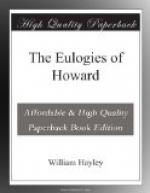For the prospect of accomplishing public good, so
devoutly to be wished, he nobly thought it a trifling
sacrifice to hazard the little remnant of his advanced
life; and, however men or nations may differ in policy
or religion, whereever there is a human spirit sufficiently
pure and enlightened to estimate public virtue, the
sentiments and the conduct of
Howard must secure
to his memory the fondest veneration. There is
a perfection and felicity in his character that appears
supremely laudable in every point of view. If,
abstracted from all religious considerations, we regard
him only as a citizen who devoted himself to the service
of his country, the brightest records of Antiquity
afford us no parallel to his merit. Had he lived
in those early times, the generous enthusiasm of the
antient world would have idolized his name. Philosophy
and Genius would have found, in his benevolent labours,
the most ample theme for instruction, and the purest
subject for universal panegyrick. They would
have celebrated him as a benefactor to mankind, who
had built a new portico to the Temple of Glory superior
to the dome itself. They would have preferred
the beneficent Philanthropist to the dazzling Conqueror,
to the fascinating Demagogue, to the attractive Sophist;
and all the various idols of public praise. But
as Antiquity exhibits no character of such unclouded
lustre, we have great reason to conclude, that such
a character could owe its existence only to the pure
and sublime spirit of our Christian Faith. Let
us, therefore, contemplate
Howard as a Christian!
it is by considering him in this light, that we shall
feel ourselves most happily related to his virtues,
and most delightfully interested in the honours they
receive.
“In the poor and calamitous objects of his regard,
in the gentleness and purity of his manners, in his
modest and magnanimous refusal of earthly honours,
in the wide extent and courageous perseverance of his
charity, we cannot fail to discern how richly he was
endowed with the genuine spirit of that pure and sublime
Religion which has the divine prerogative of converting
weakness into strength, and of giving to Humility
the influence of Power. There is not a feature
in the character, there is hardly an action in the
life of this exemplary personage, that does not mark
him as a true servant of Christ. And may we not
presume the blessed Author of our faith, in supplying
us in these dissolute times with a recent example
of such astonishing and unlimited beneficence, is
graciously pleased to afford us a new motive to prize
and to cherish that animating faith, which could form,
in an age like the present, a character so wonderfully
entitled to the veneration of the world? The
spirit of Christianity is so visible in the conduct
of Howard, that the prime objects of his attention
might be thought to have been suggested to him by
the very words in which our blessed Lord announces
to the heirs of eternal glory the source of their
beatitude—’Come, ye blessed of my
Father, inherit the kingdom prepared for you from
the foundation of the world; for I was an hungry, and
ye gave me meat; I was thirsty, and ye gave me drink;
I was a stranger, and ye took me in; naked, and ye
cloathed me; I was sick, and ye visited me; I was
in prison, and ye came unto me.’




